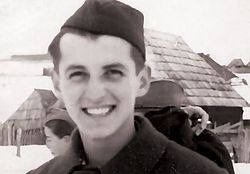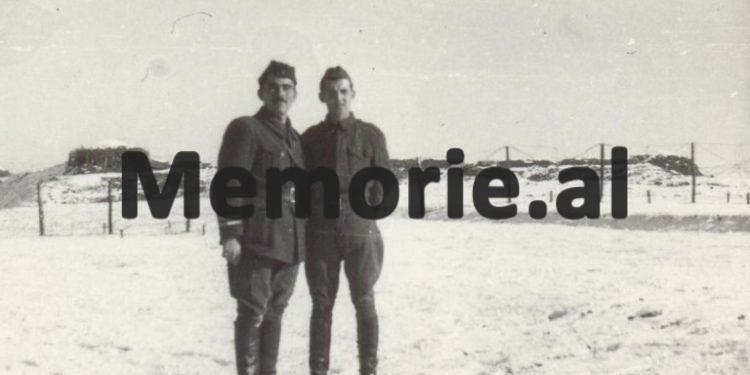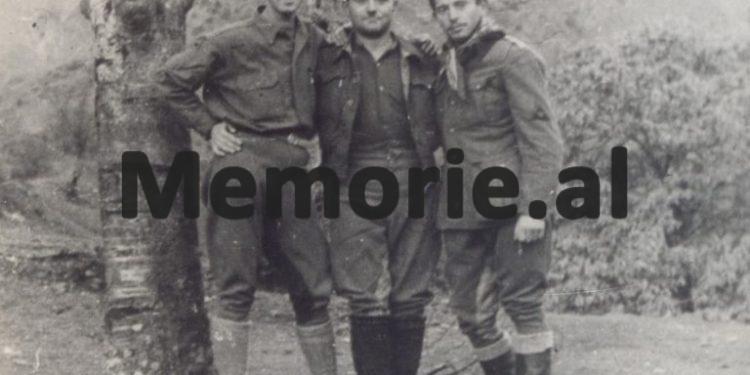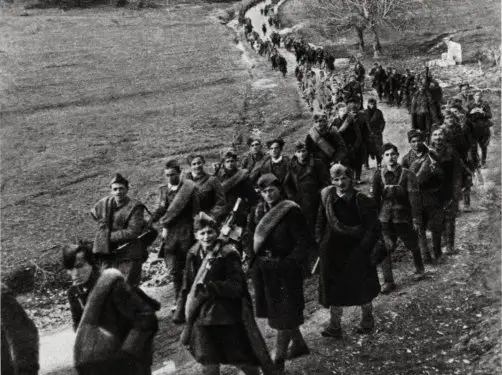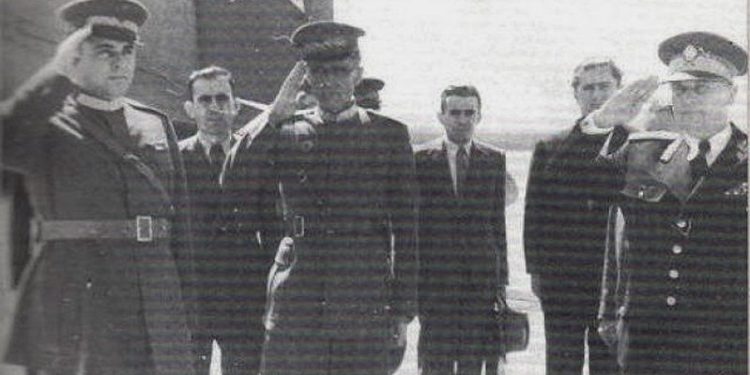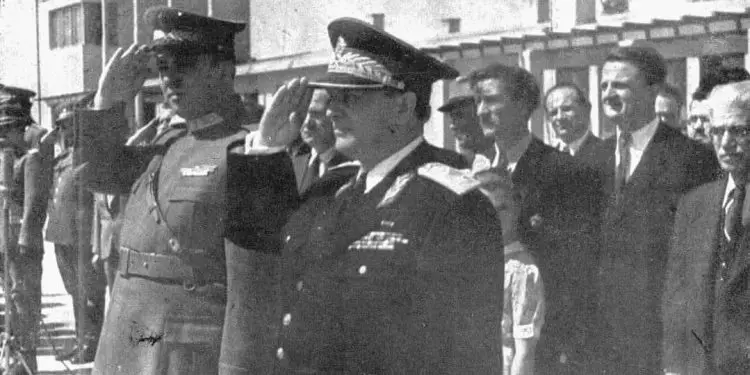Ramiz Alia’s rare testimony
Part Two
Memorie.al / “If Mehmet had been like this from 1942-43, when he was in a concentration camp, until 1981, when he committed suicide, they say 40 years. What did he wait for? He was at the head of the country. If he had been an agent of the Americans or the English, what did they want more to ruin Albania?! Mehmet would have acted”! In a long story given years ago to the magazine “ABC”, former president Ramiz Alia has told his life and confidential reports in the dome of the communist state. He has spoken for the first time about the clashes in the Central Committee and what happened a few minutes after the death of the former iron prime minister, Mehmet Shehu!.
Alia also recounts his relations with former Prime Minister Shehu, which he describes as correct, but not cold. However, it is stated that Mehmet wanted to implicate him in the Todi Lubonja case. But the surprising statement in this interview is that Mehmet Shehu was not an agent. According to Alia, if he was an agent, from the time he was in the concentration camp until 1981, when he committed suicide, he would have been able to act within such a long time, 40 years, especially since an agent like Mehmet Shehu would have been enough for the Americans and the British to overthrow the communist regime in Albania.
Continued from the previous issue
You have been accused of having, with the support of Enver Hoxha, hastened the death or elimination of figures who could have been rivals to you, such as Hysni Kapo, Kadri Hazbiu, Beqir Balluku, etc. Is that true?
R. Alia: You are a journalist and you follow up on other people’s questions. I say that such questions are absurdities, questions asked by those who want to present the history of the Albanian People’s Party as a history of clans that killed each other, as an association where the struggle for personal power was the goal of all activity, starting with Enver Hoxha and so on. No, these are elaborate fantasies, aimed at discrediting the party and the Albanian communists. As for the direct question, I will not even try to bring any argument, since there is nothing real, nothing true in it.
The press has been following these days the atmosphere of the plenums of the purge of some of the figures. What impressions do you get from reliving those scenes?
R. Alia: I have also seen these reprinted materials. I understand that many people, especially young people, do not understand many things and that many of what is said by the participants in those plenums are surprising and can even create various misunderstandings. The beginning of those plenums is what is known as the “Black Theses”, the elaboration by Beqir Balluku and a group of generals of some orientations for the army, which were contrary to the orientations that had been elaborated by the Defense Council. The investigation into this issue was carried out by Mehmet Shehu and Hysni Kapo.
They presented the conclusions to the Political Bureau and the proposals for measures against Beqir Balluku. Later it turned out that Petrit Dume and Hito Çako were not out of the game either. I do not think that these events were experienced without pain by all the leaders of the time, because practically, the main part of the Military Command was hit. But the situation was extremely serious. We are in the early 1970s. Not only the Yugoslavs, but also the Soviets were acting against our country, not to mention the Greeks, etc. Meanwhile, relations with China were also deteriorating. Under these conditions, the possibility of infiltration by a foreign agent (I am speaking in the language of the time) was not theoretical.
And when the “Theses…” were discovered, the alarm bells naturally rang. In this situation, the blow fell not only on those who were directly responsible for the “Theses…”, but also on other people, generals and senior officers, perhaps not even guilty. This was also influenced by clan “friendships” and “denunciations” about each other, when military cadres implicated their comrades, for faults and mistakes, etc. This is clearly visible, even in the discussions and answers given by some of the accused cadres in the plenum.
What impression do their discussions leave?
R. Alia: They are undoubtedly very fragmentary and have an investigative character. I emphasize that they reflect the spirit of another time, characterized by numerous difficulties.
For a relatively long period, the Albanian press has given space on its pages to stories that have subjects, events, characters from the dictatorship period. Somewhere in a nostalgic way, somewhere in a documentary way, somewhere in a forced way or, full of protagonism manners, etc. How do you judge this return of the topic of the dictatorship, on the pages of the Albanian press? Is it a historical need, does it fill a gap in documentary literature, or what?
R. Alia: I think that first of all this issue has to do with the knowledge of the history of our country, because it must be said that during these years of transition, for one reason or another, many things have been distorted and people are worried. That is why they want to learn. I am taking the issue of the National Liberation War. It is said: it was not a liberation war, but a war for power or, worse, it was a civil war, fratricide.
The people who fought this war, all those partisans or fighters, who themselves participated in this war or the people, the people of the village and the city who supported this war, want to know what the truth is? Or take the problem of socialism, all kinds of distortions are said in that direction too.
Let’s stay with the war. There are some figures of that war, which have been seen for 50 years, through a certain prism. But in the meantime, from this literature, which we are talking about, figures like Zef Malaj, or other figures of the communist movement, who were eliminated by Enver Hoxha, come to us in a new light. Or we learn that Abaz Kupi was an important figure in the establishment of the structures of the National Liberation Army. Do you agree that some of the historical judgments about these figures should be revised, or not?
R. Alia: I hold to one opinion. First of all, when we talk about history, we should focus on what is main. People in Albania must necessarily have the absolute conviction that the war that took place was a liberation war, a war that aimed primarily at liberating our homeland from the Italian and German invaders. This is fundamental.
Then I agree that special phenomena can also be seen. Zef Malaj, who you mentioned, is not the National Liberation War of the Albanian people. A person is a person. Mistakes may have been made against him, bad things may have been done, but he is a person and the stories about him cannot define the character and great role of the National Liberation War…!
Enver made mistakes…?
R. Alia: Enver was the Commander-in-Chief of the National Liberation Army. And this army achieved the liberation of Albania. This is the main thing. Were mistakes made, did Enver make mistakes, you ask? Enver was a human being, and consequently he also had his own mistakes, which need to be analyzed specifically. But I will not dwell on this issue. I was talking about the War and the assessments made about it. I emphasize that our war was a war of liberation.
It was not a civil (fratricidal) war. A civil (fratricidal) war took place in Greece after the war, when it came to who would be put in power. In Albania, this did not happen. Someone says; but the war with the ‘Ballin Kombëtar’, is it not a fratricidal war? No, it was a war with collaborators of fascism, because the ‘Ballin Kombëtar’ sided with the Italian fascists, against the war for liberation. It is not a fratricidal war. That is why I am of the opinion that first of all we should dot the i’s, the main thing, and then we can talk about special cases.
I have stated and written before and I say it here with you now, that there have certainly been mistakes, there have also been wrong actions, in the sense that they have cost the lives of one another, perhaps even more than one another. There is no doubt that these must be seen, but these do not refute the National Liberation War, as attempts are made today, by citing one, two, five or ten negative examples.
Now, of course, there may be political and academic segments that may have such an aim, but there is also a general aim, which is the correct writing of history, which has been ideologized, which has been done in accordance with the ideology of that class, that political group that was in power, not to mention that even today a good part of the historians who dominate the Albanian scientific scene are the writers of that history and who find it difficult to deny what they have written. So I am asking you, should we change, – we have understood that we should not move from the main objective -, should we change the attitude that history should take towards such figures as; Nako Spiru, Zef Malaj or other figures who were eliminated by the dictatorship?
R. Alia: It is not just some segments of politics that raise such problems regarding the war. An opinion is being created. The very fact that it is proposed in the Albanian parliament to remove the date of May 5 and establish April 7 as martyrs’ day shows that the National Liberation War of the people itself is being attacked, that it is being branded as a fratricidal war. You are from Cologne.
Safet Butka, whom I had as the director of the state gymnasium when I was a student, fought against the Italians. He has since published in his own tract, the “Dalmaco-Këlcyra Agreement”, denouncing the ‘Ballin Kombëtar’, although he himself was a member of the ‘Ballin Kombëtar’, but belonged to that part that wanted the war against the invader and not cooperation with the invader. But now, even some ‘ballist’ historian is trying to convince people that there was no “Dalmaco-Këlcyra”.
Are you manipulating official history…?!
R. Alia: No, I am not manipulating it.
That Safet Butka has been considered a traitor by communist historiography until now. Are you reviewing it…?
R. Alia: No, no, I am absolutely not reviewing it with what I say. I spoke about a real fact and did not do either the biography or the assessment of Safet Butka’s figure. I only said this fact to prove that the collaboration of ‘Balli’ with the occupier was also condemned by a former Ballist, like Safet Butka. If you want me to specifically tell you more about that figure, we can discuss it, although I am not very up to date with his concrete activity during the War.
Now I come to Nako Spiru. I am telling you that Nako Spiru was an honest communist; he was a determined anti-fascist fighter, a prominent leader. Nako Spiru throughout the Anti-fascist War and after the liberation of Albania remains in my opinion, the figure of a determined fighter, not only in the war, but also for the development of Albania. Nako Spiru killed himself because he fell victim to the Yugoslavs. This must be said bluntly…!
Nako Spiru also fell victim to Enver Hoxha’s lack of support, to Yugoslav pressure…?
R. Alia: It is possible. Enver did not support him, but what position was he in at that time? The Berat Plenum had taken place and Enver himself had been branded as anti-Yugoslav. However, it can be discussed…!
Was it the lack of this support from the Yugoslav pressure that led him to suicide or not?
R. Alia: No, it is not this lack that led him to suicide. Nako was expecting an answer from the Soviets. However, those who led him to suicide, Nako, are the Yugoslavs; it is the accusation that the Yugoslavs made that; you are an agent of imperialism that you are collaborating with the imperialists, against Albanian-Yugoslav friendship. This was the main, even decisive one.
If we get caught up in the fact of whether or not the ix or the ypsilon received it, we will be moving away from what is fundamental. Otherwise, whether we like it or not, we are making Yugoslavia, Tito and his friends innocent. This is not right. I do not know why people want to rehabilitate Tito and Yugoslavia, in relation to Albania. No, brothers. Albania has always been and today is; do not forget this, in the barrel of the Serbs’ rifle, for their own reasons. Just as it was for the Greeks.
Now, looking for the blame for Nako’s suicide on others, my impression, and I would say this to Liri Belishova in the face, is that Tito and the Yugoslavs are being protected. No, they are the ones who killed Nako Spiru, they pushed Nako Spiru to murder. And if they gave Nako the time he asked for, for the Bureau meeting, so even if Enver Hoxha and Koçi Xoxe (Koçi Xoxe at that time had great power, even greater than Enver), would let Nako speak, Nako’s fate was determined by the Yugoslavs, period. I do not defend Enver Hoxha.
I agree that Enver Hoxha was wrong, because by listening to Nako, he could learn some things that he might not have known. But still, I will also become Enver’s lawyer, because there are also mitigating circumstances. Don’t forget the situation, we are in 1947. Enver Hoxha was a victim of Berat, of the Yugoslav attack on Berat. So Enver Hoxha was also in the hands of the Yugoslavs, so he was not completely free in his actions. I said, Koçi Xoxe had full power.
He was not free, since he asked for Tito to be appointed secretary of the Party of Labor of Albania, right? Did Enver Hoxha ask for such a thing, as is evident from the documents?
R. Alia: I don’t know, I don’t know that he asked. I have the impression that these are abuses of history.
They are not retouchings of history…?
R. Alia: No, no, they are abuses.
Did those who wrote the history in your time remove it and now it results from a summary of relations with Yugoslavia, that he requested such a thing…?
R. Alia: I don’t know if they removed it or added it. I haven’t heard it, it’s the first time I’ve heard this issue.
Do those who have reviewed the documents on Albanian-Yugoslav relations say this…?
R. Alia: It’s possible, but I haven’t read about this issue myself. The problem is that history must be seen with our feet on the ground that is, judging according to the specific time. At that specific time, Enver could have said what you say, because it is known that in 1947 both Enver and Koçi Xoxe, first of all, were moving towards strengthening relations with Yugoslavia, towards close cooperation with the Yugoslavs, by unifying customs, even the currency. So, we would supposedly become one united nation.
Confederation?
R. Alia:Already to the confederation.
Did he agree with the idea of the confederation…?
R. Alia:At that time he may have agreed and may have said what you say. But the problem is here, that it became clear that with Nako’s suicide, all the cards were revealed.
Since you say that we should maintain a critical stance towards Tito, – I am one of those who do, – I am asking you; how do you explain your failure to maintain a stance at that time, towards a terrible crime that was committed against a part of the Albanian nationalists, who were taken from Kosovo and killed in Montenegro, in a march that had deaths, murders along the way and then a mass execution, in a place around Ulcinj. I want to ask you, about this: you too have been accused of quite a few…?
R. Alia: I had no connection with this phenomenon, nor was I aware of it at the time, because when this happened, I was in Sandzak with the 5th Division, so I have no idea what was done down there. But regardless of this…!
When did you find out?
R. Alia: I found out after the liberation, after a long time had passed. / Memorie.al
To be continued in the next issue




